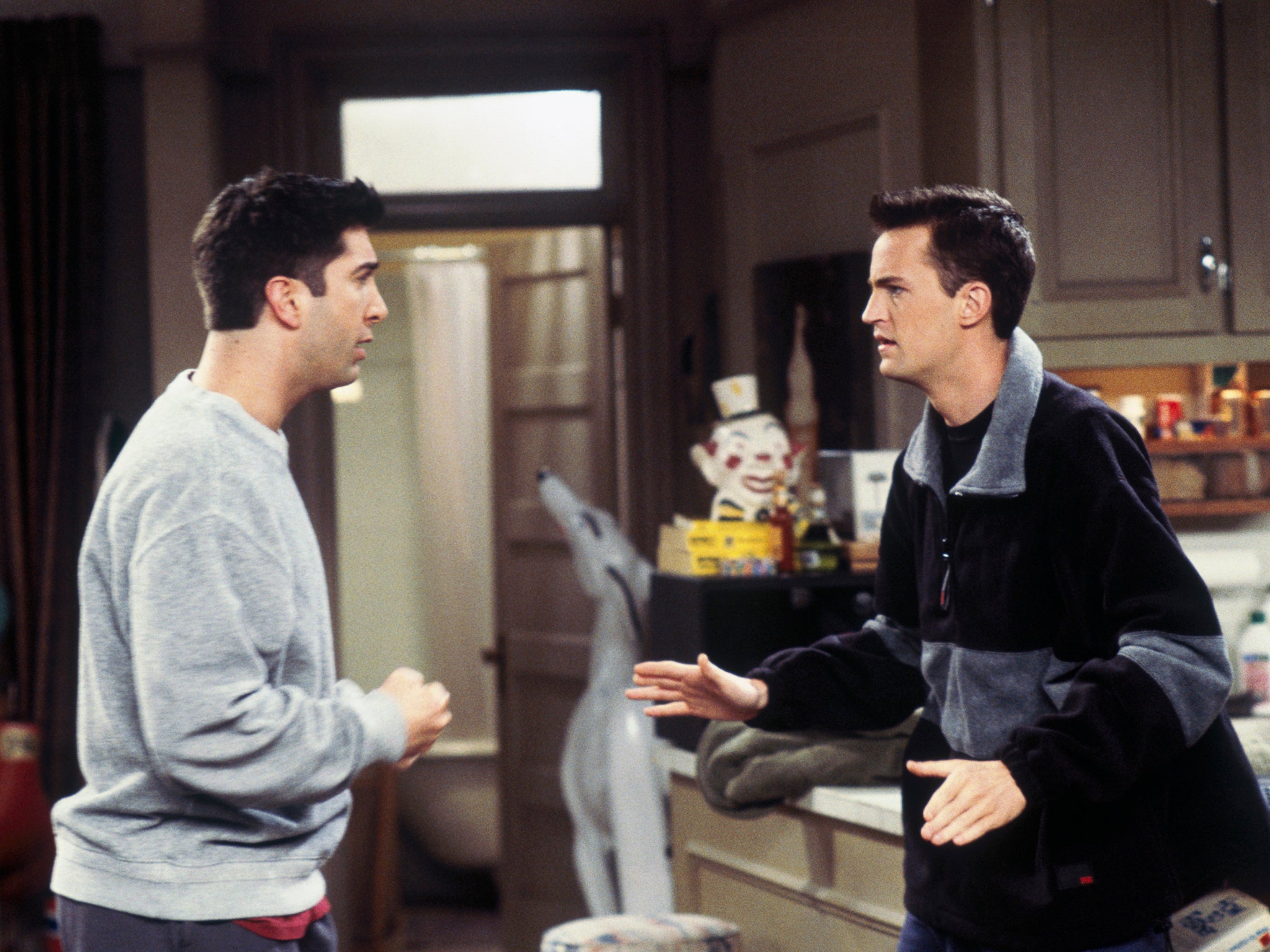This is what Chandler Bing taught me about anxiety
While ‘Friends’ didn’t always encourage open conversation, Chandler’s struggles with relationship anxiety did make me feel less alone


Your support helps us to tell the story
From reproductive rights to climate change to Big Tech, The Independent is on the ground when the story is developing. Whether it's investigating the financials of Elon Musk's pro-Trump PAC or producing our latest documentary, 'The A Word', which shines a light on the American women fighting for reproductive rights, we know how important it is to parse out the facts from the messaging.
At such a critical moment in US history, we need reporters on the ground. Your donation allows us to keep sending journalists to speak to both sides of the story.
The Independent is trusted by Americans across the entire political spectrum. And unlike many other quality news outlets, we choose not to lock Americans out of our reporting and analysis with paywalls. We believe quality journalism should be available to everyone, paid for by those who can afford it.
Your support makes all the difference.“You’re so sarcastic, you’re just like Chandler,” my friends would always tell me. In my early twenties, I used humour as a defence mechanism and had a penchant for waistcoats. So yeah, fair enough.
But now, looking back on 15 years of anxiety, coming close to thirty and being engaged to my partner, I’ve just realised why I really am Chandler. He is a fundamentally anxious character who can teach us a lot about prevailing ideas on mental health, relationships and the positive and negative ways society still reacts to them.
Since my teens, regular, uncomfortable intrusive thoughts have got stuck in my head, just like the theme song from a sitcom. Many people get intrusive thoughts – “What if I kissed my boss?”, “What if I bit my massage clients’ bum?”, “What if I fancy my cousin?” – but I experienced them every day, before I’ve even had chance to open my eyes.
I would have thoughts about everything from awkward sexual encounters to natural disasters, and the only way to control them was to follow a routine: eyes open, headphones, pee (don’t flush), brush teeth, headphones off, shower (for three minutes max), get dressed, headphones back on, make breakfast.
I didn’t know what to call this, but Chandler was the first voice I heard express something similar: “You know when you’re in bed, with a woman, and you’re fooling around and you get all these mental images popping into your brain…and all of a sudden, your mom pops into your head. And you’re like mom! Get out of here!’”
Sometimes, in the throes of passion, I wouldn’t be able to get the image of Liverpool striker Mohamed Salah out of my head. He’s an attractive and talented man, but he wasn’t what I wanted to be focusing on in those moments.
In the Friends episode, Chandler’s confession is met with anger and fear from one of his closest friends: Ross responds to him by saying “I said share, not scare. Go sit over there!’” That scene taught me to expect the same if I ever voiced my intrusive thoughts.
It’s clear to me that the writers of this light-hearted sitcom didn’t want to explore how anxious Chandler actually is. Like so many people nowadays, they didn’t want Ross to ask questions like: “Have you ever thought about how great a well-funded NHS, which caters to all levels of mental illness and mental health issues, would be?”
That said, while this Friends dialogue didn’t encourage open conversation, it did inspire me to get help, as it made me feel like I wasn’t completely alone. While at a breaking point with my mental health, I used this TV moment to explain how I felt to a counsellor, and she offered me the phrase “intrusive thoughts”. This lightbulb moment led to me getting a proper referral to NHS wellbeing services, medication and a really considerate cognitive behavioural therapist.
But Chandler isn’t offered any of that in Friends. Instead, his anxiety around sex and relationships continues throughout the show. He tells us: “When I first meet somebody it’s usually panic, anxiety and a great deal of sweating.” I too suffered with a lot of early relationship anxiety, and not just the butterflies-in-my-stomach, pre-date-jitters. I’m talking about a full-blown panic attack outside a Camden pub because I was afraid I would throw up or do something equally embarrassing on a date.
I would sweat, feel sick, and would be unable to eat in front of someone else. Like Chandler, who physically cannot stomach turkey thanks to its association with family troubles (“It’s very hard to enjoy Thanksgiving dinner once you’ve seen it in reverse” he explains), all my mealtimes started to become difficult. It wasn’t to do with putting on or losing weight, but every time I went to eat, I’d feel a tightness in my chest and become convinced I would not be able to finish the food.
Throughout the early stages of a relationship, i’d panic at the smallest things: what drink someone ordered, whether they’d text me back, what to do when the person I’m dating uses all my tomatoes without asking. Chandler’s black and white, all-or-nothing approach (swinging between breaking up with Janice and a full blown proposal) rang so true with me. No one told me the rules of the dating game; no one told me it was going to be this way.
Anxiety began to threaten my potential happiness in relationships, so much so that I thought I would never be able to get over it and go on a normal date. But Chandler gave me hope. I saw his relationship with Monica grow, and I began to understand that through conversation, therapy and controlled exposure to the things that frightened me, I could enjoy a good relationship too.
To keep up to speed with all the latest opinions and comment sign up to our free weekly Voices Dispatches newsletter by clicking here
I’ve been thinking about Chandler’s fear of commitment a lot recently. I’ve had intrusive thoughts like: do I have to have kids? What if I cheat on my partner? What if I don’t love her enough? These are all common thoughts for people with anxiety disorders.
But again, Chandler and Monica’s relationship soothes me: just like them, my partner and I were best friends who got drunk and slept together, and just like Chandler, and I worry about having a panic attack on our wedding day.
But I won’t, because of what Chandler taught me: he gets some excellent advice from Ross when he experiences this exact scenario. Ross asks him to do one small thing at a time: go home, take a shower, put on a tuxedo. This mimics my recent cognitive behavioural therapy where I had to build an exposure ladder of things that made me anxious. Step by step, I would build up to being able to take on the truly huge things that scared me. Which ended, rather excitingly, in me proposing to my girlfriend.
One of the many things that Chandler’s anxiety (or Chanxiety, as I’ve come to call it) teaches me about my own mental health is that our conversations around it have developed since the show aired, but it still feels like a mixed messaging. We’re told repeatedly to share our feelings but, like Ross, people around us sometimes still react with fear. I don’t often tell close friends about the extent of my anxieties for fear they will judge me.
Ultimately, we need to make more of the good bits of advice from Friends. We need popular culture that offers practical tools for mental health issues in an accessible way: describing the feeling of a panic attack, how to cope with the ups and downs of depressive episodes and, most importantly, a state- funded mental health service which really will be there for you when the rain starts to fall.
Join our commenting forum
Join thought-provoking conversations, follow other Independent readers and see their replies
Comments